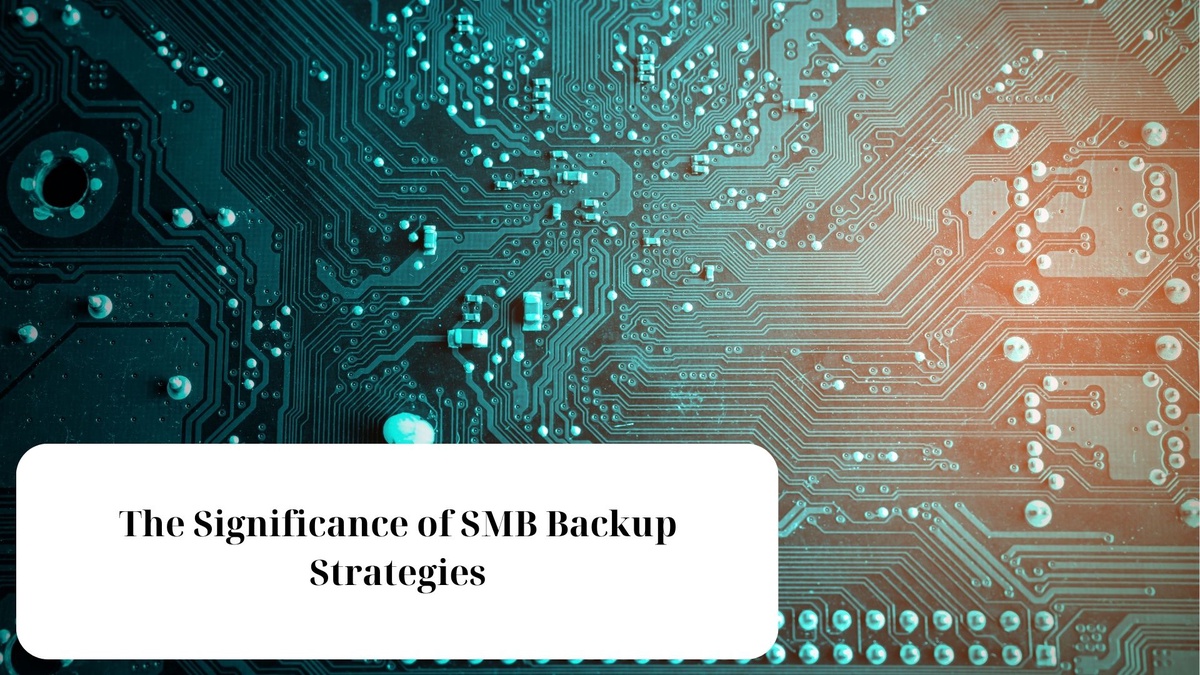In the digital age, data reigns supreme, and its protection is paramount. For small and medium-sized businesses (SMBs), the stakes are high; data loss can translate to financial setbacks, reputation damage, and even survival risks.
Enter the world of SMB backup strategies – the unsung heroes of data resilience. In an era where information is king, having a robust backup plan isn't just an option; it's a necessity.
In this article, we'll delve into the critical importance of SMB backup strategies. We'll explore the rising value of data for SMBs, the ever-present risks of data loss, and the tangible benefits of a strong backup strategy. Moreover, we'll provide practical insights to help SMBs build and bolster their backup plans, ensuring that their data remains safe and sound in an unpredictable digital landscape.
Data's Growing Value and Risks
In today's digital landscape, data has become the currency of business. For small and medium-sized businesses (SMBs), this data represents not only the heart of their operations but also a valuable asset that can drive growth, innovation, and competitiveness.
The value of data for SMBs is evident in various ways:
- Decision-Making: Data empowers SMBs to make informed decisions. From customer preferences to market trends, data-driven insights guide strategic choices that can lead to success.
- Customer Relationships: SMBs rely on data to personalize customer experiences. From targeted marketing campaigns to personalized recommendations, data allows SMBs to connect with their audience on a deeper level.
- Operational Efficiency: Data streamlines operations. Inventory management, supply chain optimization, and resource allocation all benefit from data-driven approaches, improving efficiency and reducing costs.
However, with great value comes great risk. SMBs face a range of threats to their data, including:
- Cyberattacks: Hackers target SMBs due to perceived vulnerabilities, aiming to steal data, disrupt operations, or demand ransoms.
- Hardware Failures: Equipment malfunctions or failures can result in data loss if not properly backed up.
- Human Error: Employees can inadvertently delete or corrupt data, leading to potential loss.
- Natural Disasters: Fires, floods, and other disasters can physically damage hardware and data centers, making data recovery difficult.
In this context, the importance of SMB backup strategies becomes evident. These strategies serve as a safety net, protecting invaluable data from risks and ensuring that businesses can thrive in a data-centric world. In the following sections, we'll explore how SMBs can navigate these challenges and safeguard their data through effective backup plans.
SMB Backup Essentials
When it comes to safeguarding critical data, small and medium-sized businesses (SMBs) must adopt a proactive approach. This begins with understanding the unique essentials of SMB backup strategies:
- Data Variety and Volume: SMBs often deal with diverse data types, from customer records to financial documents. Backup strategies must account for this variety and accommodate the growing volume of data.
- Data Recovery Speed: In the event of data loss, downtime can be costly. SMB backup solutions should prioritize fast data recovery to minimize disruptions to operations.
- Scalability: SMBs experiencing growth require backup solutions that can scale with them. Scalability ensures that backup systems can handle increasing data loads without compromising performance.
- User-Friendly Interfaces: SMBs typically lack dedicated IT teams. Backup solutions should feature user-friendly interfaces, making them accessible to non-technical staff for day-to-day management and recovery tasks.
- Data Security: SMBs must prioritize data security. Backup solutions should include encryption options and access controls to protect sensitive information.
- Automated Backup: Manual backups are prone to errors and delays. SMBs benefit from automated backup processes that run at scheduled intervals, reducing the risk of data loss.
- Data Retention Policies: Implementing clear data retention policies ensures that backups are both comprehensive and efficient, avoiding the unnecessary storage of outdated data.
- Offsite and Cloud Options: SMBs need backup strategies that include offsite or cloud-based storage to protect data from physical disasters or onsite breaches.
- Budget Considerations: SMBs often operate under budget constraints. Backup solutions should be cost-effective while delivering essential features.
- By focusing on these SMB-specific essentials, businesses can tailor their backup strategies to fit their unique needs and vulnerabilities. In the subsequent sections, we'll delve into the benefits of robust SMB backup strategies and how they can mitigate risks and enhance operations.
Benefits of Strong Backup
For small and medium-sized businesses (SMBs), a strong backup strategy isn't just a precaution; it's a proactive measure that yields numerous benefits:
- Business Continuity: A robust backup strategy ensures that essential data and systems can be quickly restored in case of data loss or system failures. This minimizes downtime, allowing business operations to continue smoothly.
- Data Integrity: Data is a precious asset, and its integrity is paramount. A strong backup strategy safeguards data against corruption, accidental deletion, or cyberattacks, preserving its accuracy and reliability.
- Disaster Recovery: Natural disasters, cyberattacks, or hardware failures can strike unexpectedly. A well-planned backup strategy serves as a lifeline, facilitating swift disaster recovery and reducing potential losses.
- Cost Savings: The financial impact of data loss can be substantial, including recovery costs, lost revenue, and potential fines for data breaches. A strong backup strategy mitigates these costs, offering a cost-effective insurance policy.
- Competitive Edge: SMBs can gain a competitive advantage by demonstrating their commitment to data security and continuity. This can inspire customer trust and attract clients who prioritize reliable business partners.
- Compliance Compliance: Many industries have specific data retention and protection regulations. A strong backup strategy ensures compliance, reducing the risk of legal issues and fines.
- Flexibility and Scalability: As SMBs grow, their data needs evolve. A strong backup strategy offers the flexibility to scale resources up or down, adapting to changing business requirements.
- Peace of Mind: Knowing that critical data is secure and recoverable provides peace of mind to business owners, employees, and stakeholders.
- Reputation Management: In the digital age, reputation is everything. A strong backup strategy helps SMBs maintain their reputation by preventing data breaches and ensuring customer trust.
- Innovation and Growth: With data protection in place, SMBs can focus on innovation and growth without the constant worry of data loss. It frees up resources for strategic initiatives.
In essence, a strong backup strategy is an investment in the present and future of an SMB. It safeguards against unforeseen challenges, supports growth, and allows businesses to thrive with confidence. In the following sections, we'll explore practical steps for SMBs to implement and enhance their backup strategies effectively.
Building an Effective Strategy
Building a robust backup strategy is the cornerstone of data protection for small and medium-sized businesses (SMBs). Here are the essential steps to create an effective backup strategy:
- Data Assessment: Begin by identifying and categorizing your data. Determine what is critical for business operations and what can be archived or deleted. Consider compliance requirements that may apply to your industry.
- Backup Tools Selection: Choose reliable backup tools that align with your data assessment. This is where solutions like NAKIVO Backup and Replication can shine, offering comprehensive data protection, automation, and ease of use for SMBs.
- Backup Frequency: Determine how often backups should run. Critical data may require real-time or daily backups, while less critical data can be backed up less frequently.
- Data Retention Policies: Establish clear data retention policies to manage backups efficiently. Define how long different types of data should be retained and when they can be safely purged.
- Storage Options: Consider where you will store backups. A combination of onsite (local) and offsite (cloud or remote) storage ensures redundancy and protection against various threats.
- Disaster Recovery Plan: Develop a disaster recovery plan that outlines the steps to take in the event of data loss or system failure. Test this plan regularly to ensure its effectiveness.
- Security Measures: Implement security measures such as encryption and access controls to safeguard backup data from unauthorized access.
- Monitoring and Alerts: Set up monitoring and alert systems to promptly identify any issues with your backup processes.
- Employee Training: Ensure that your team is trained in backup procedures and understands their roles in the event of data loss or recovery.
- Regular Testing: Regularly test your backups and recovery processes to confirm that they work as expected. This helps identify and address any potential issues before a crisis occurs.
By following these steps, SMBs can build effective backup strategies that align with their unique needs and challenges. Solutions like NAKIVO Backup and Replication can play a pivotal role in this process, offering reliable data protection and peace of mind for SMBs in their quest to secure their valuable data assets.
Conclusion
In the world of small and medium-sized businesses (SMBs), data is not just information; it's the lifeblood of operations, innovation, and growth. The significance of safeguarding this invaluable asset cannot be overstated. A strong backup strategy is not merely a precaution; it is a proactive measure that empowers SMBs to thrive in the digital age.
By recognizing the growing value of data and the myriad risks it faces, SMBs take the first step toward resilience. Understanding that data loss is not a matter of "if" but "when," they embrace the essentials of SMB backup strategies—tailored to their unique needs, resources, and aspirations.
The benefits of a robust backup strategy extend beyond data protection. They encompass business continuity, cost savings, competitive advantage, and peace of mind. SMBs with strong backup plans are not just survivors; they are thrivers, unburdened by the constant fear of data loss.
As technology evolves and SMBs continue to grow, the need for effective backup strategies remains timeless. It is here that solutions like NAKIVO Backup and Replication shine, offering comprehensive data protection and scalability tailored to the SMB landscape.


No comments yet